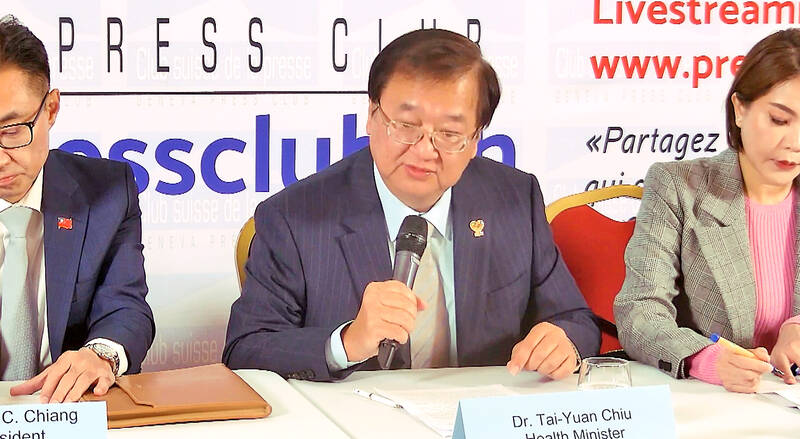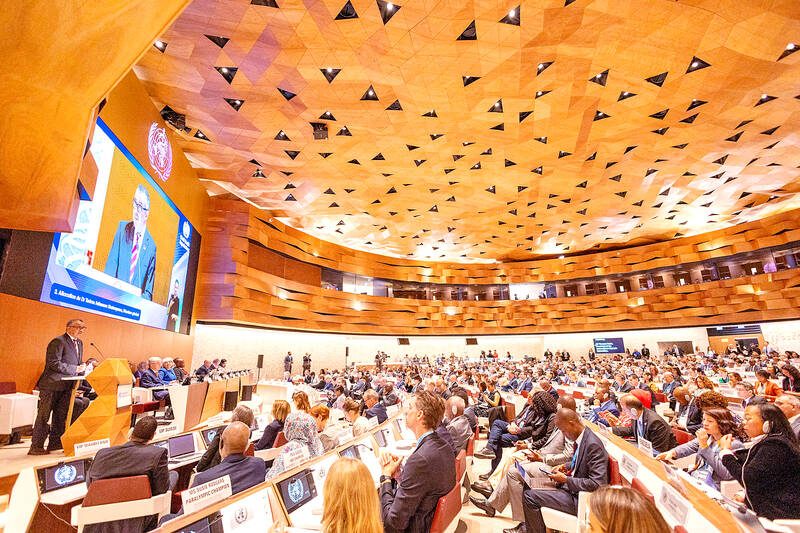Minister of Health and Welfare Chiu Tai-yuan (邱泰源) yesterday again called for the international community’s support as he urged the WHO to let Taiwan participate as an observer in the World Health Assembly (WHA).
The annual meeting of the WHA, the decisionmaking body of the WHO, began in Geneva, Switzerland, yesterday and ends on Saturday.
As Taiwan has not been invited to attend the WHA as an observer for the eighth year in a row, a delegation of health officials and experts led by Chiu arrived in Geneva on Friday to speak up for Taiwan and take part in bilateral meetings on the sidelines of the WHA.

Photo: screen grab from the Ministry of Foreign Affairs’s Facebook page
Joined by four legislators from across party lines, Chiu held an international news conference at the Geneva Press Club to speak about “How Taiwan’s participation in the WHO can contribute to a comprehensive global health network.”
“We are calling for the international community’s support and urging the WHO to act in line with this year’s WHA theme — ‘All for Health, Health for All’ — by including Taiwan in the proceedings of the WHA as an observer, and allowing Taiwan’s regular participation in WHO meetings, activities and mechanisms,” Chiu said in his opening remarks.
Taiwan supports actions that can save lives — promoting health and well-being, advancing primary healthcare, ensuring universal health coverage and meeting the UN Sustainable Development Goals, but the WHO continues to exclude Taiwan for political reasons, he said.

Photo: Reuters
“I would like to reaffirm that neither UN General Assembly Resolution 2758 nor WHA Resolution 25.1 mentioned Taiwan or provide legal authorization for the People’s Republic of China [PRC] to represent Taiwan in the UN system,” he said.
“Precluding Taiwan’s meaningful participation in the WHO based on these resolutions cannot be justified,” Chiu said.
“Neither the Republic of China [Taiwan] nor the PRC is subordinate to the other,” he said, adding that that is “the status quo across the Taiwan Strait and an internationally recognized objective fact.”
“China has no right to interfere with or restrict Taiwan’s participation,” he said, stressing that only the democratically elected government of Taiwan can represent its 23 million people in the WHO and other international forums.
“We sincerely appreciate the support extended by diplomatic allies and like-minded countries for Taiwan’s meaningful participation in the WHO,” he added.
Taiwan, being a force for good, has the capability and willingness to contribute to global health and well-being, and the whole world would benefit from its inclusion to the WHO and WHA, Chiu said.
Asked what name Taiwan would use to join the WHO, Chiu said. “Taiwan is Taiwan, and our country name is the Republic of China (ROC), so using ‘Taiwan’ or ‘ROC’ for joining the WHO or the WHA is what we will insist.”
Asked if Taiwan would find alternative ways to join the WHO or the WHA, aside from winning support from diplomatic allies and like-minded countries, Chiu said that, in the past few decades, Taiwan has educated and trained many outstanding healthcare professionals, and they have not only elevated the quality of domestic healthcare, but also participated in many international organizations.
Many Taiwanese healthcare professionals also play important roles in international organizations, such as the Taiwan Medical Association, which helped draft the World Medical Association’s statement on health emergency responses, he said, adding that Taiwan has more than 100 professional healthcare groups and their efforts would be the foundation of Taiwan’s successful WHO and WHA bid.
Many Taiwanese healthcare professionals are getting further education or training in other countries and building friendships with local professionals, who might eventually also hold key positions in world organizations, so the government would continue to provide more resources to professional healthcare associations to encourage international participation, he said.

Conflict with Taiwan could leave China with “massive economic disruption, catastrophic military losses, significant social unrest, and devastating sanctions,” a US think tank said in a report released on Monday. The German Marshall Fund released a report titled If China Attacks Taiwan: The Consequences for China of “Minor Conflict” and “Major War” Scenarios. The report details the “massive” economic, military, social and international costs to China in the event of a minor conflict or major war with Taiwan, estimating that the Chinese People’s Liberation Army (PLA) could sustain losses of more than half of its active-duty ground forces, including 100,000 troops. Understanding Chinese

The Ministry of Foreign Affairs (MOFA) yesterday said it is closely monitoring developments in Venezuela, and would continue to cooperate with democratic allies and work together for regional and global security, stability, and prosperity. The remarks came after the US on Saturday launched a series of airstrikes in Venezuela and kidnapped Venezuelan President Nicolas Maduro, who was later flown to New York along with his wife. The pair face US charges related to drug trafficking and alleged cooperation with gangs designated as terrorist organizations. Maduro has denied the allegations. The ministry said that it is closely monitoring the political and economic situation

UNRELENTING: China attempted cyberattacks on Taiwan’s critical infrastructure 2.63 million times per day last year, up from 1.23 million in 2023, the NSB said China’s cyberarmy has long engaged in cyberattacks against Taiwan’s critical infrastructure, employing diverse and evolving tactics, the National Security Bureau (NSB) said yesterday, adding that cyberattacks on critical energy infrastructure last year increased 10-fold compared with the previous year. The NSB yesterday released a report titled Analysis on China’s Cyber Threats to Taiwan’s Critical Infrastructure in 2025, outlining the number of cyberattacks, major tactics and hacker groups. Taiwan’s national intelligence community identified a large number of cybersecurity incidents last year, the bureau said in a statement. China’s cyberarmy last year launched an average of 2.63 million intrusion attempts per day targeting Taiwan’s critical

‘SLICING METHOD’: In the event of a blockade, the China Coast Guard would intercept Taiwanese ships while its navy would seek to deter foreign intervention China’s military drills around Taiwan this week signaled potential strategies to cut the nation off from energy supplies and foreign military assistance, a US think tank report said. The Chinese People’s Liberation Army (PLA) conducted what it called “Justice Mission 2025” exercises from Monday to Tuesday in five maritime zones and airspace around Taiwan, calling them a warning to “Taiwanese independence” forces. In a report released on Wednesday, the Institute for the Study of War said the exercises effectively simulated blocking shipping routes to major port cities, including Kaohsiung, Keelung and Hualien. Taiwan would be highly vulnerable under such a blockade, because it